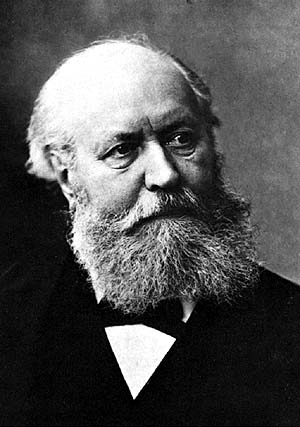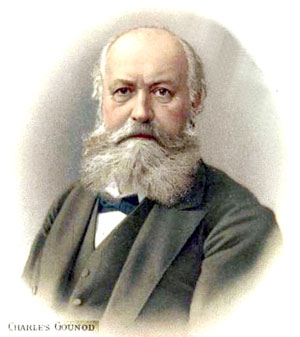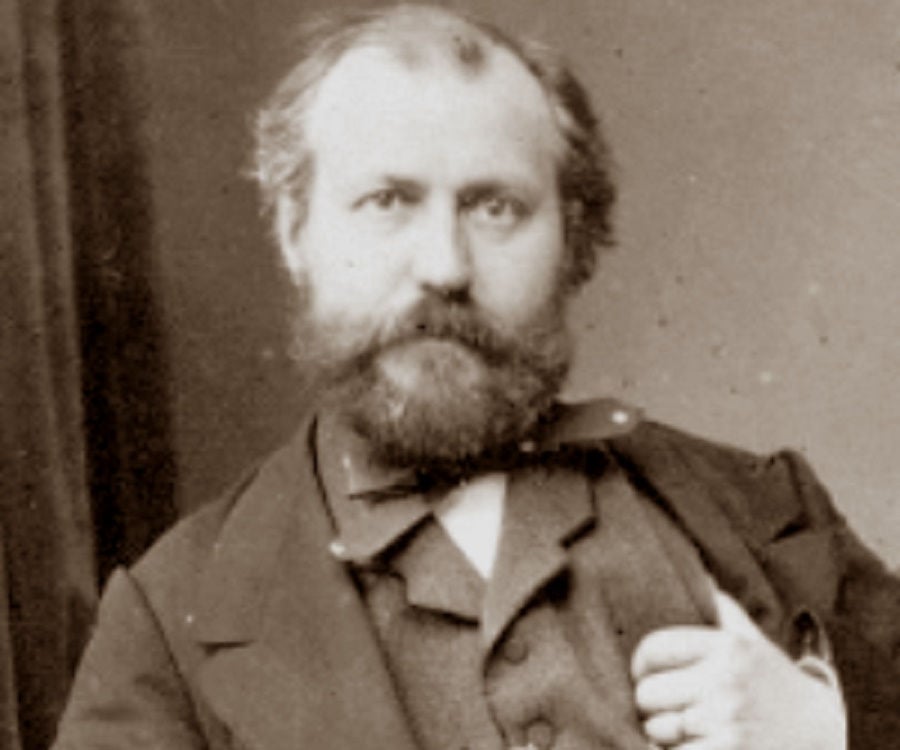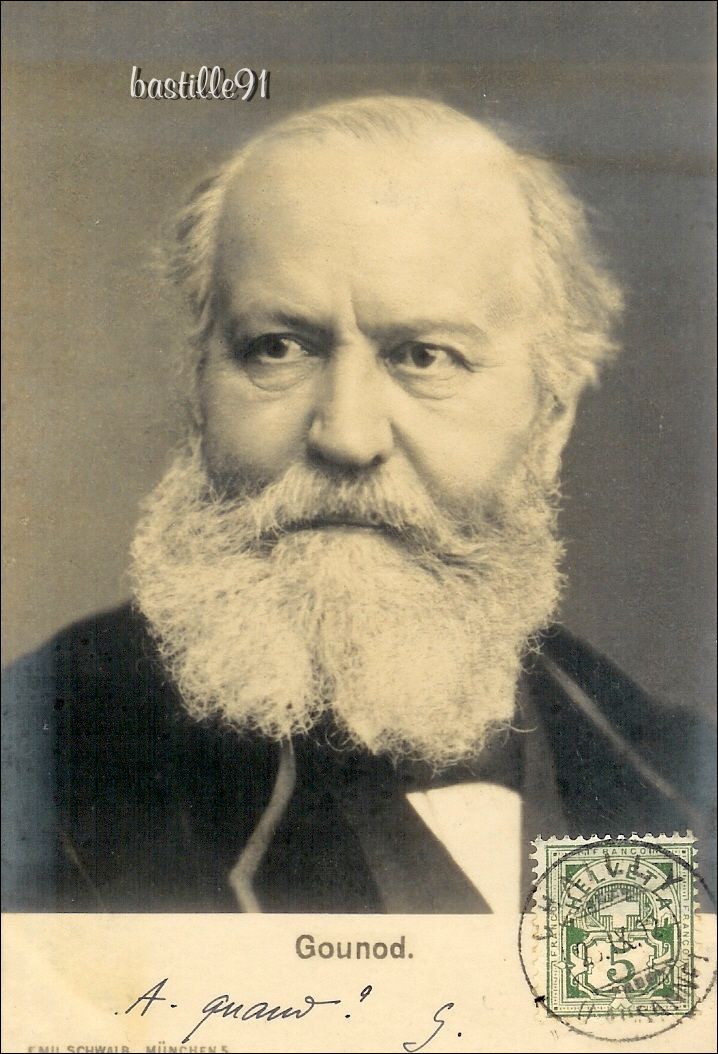Charles Gounod
Charles François Gounod ( born June 17, 1818 in Paris, † October 18, 1893 in Saint-Cloud ) was a French composer.
Life
Gounod, son of a painter, has already received early music lessons from his mother, a pianist. He studied privately with Anton Reicha and in 1836 at the Paris Conservatory with Jacques Fromental Halévy, Jean -François Lesueur, and Ferdinando Paer. In 1839 he received the Prix de Rome for his cantata Fernand and traveled to Italy to learn the music of the old masters, especially Palestrina. In 1842 he left Rome to Vienna and arrived in 1843 on Berlin and Leipzig to Paris again.
After his return was Gounod church conductor and organist in Paris. He wanted to be clerics and accordingly studied from 1846 to 1848 at Saint- Sulpice. But he finally turned to opera composition, although his first opera, Sappho 1851 was not a great success. In 1852 he married Anna Zimmerman, the daughter of a piano teacher at the Conservatory. From 1852 to 1860 was director of Gounod Orphéon de la Ville de Paris, the largest male voice choir in the city. Only his opera Faust earned him the 1859 breakthrough as a respected composer and is still considered his masterpiece. ( In Germany, this opera is often played under the title of Margaret, in order to emphasize the difference to Goethe's Faust. ) Gounod was one of the most respected representatives of the typical French opéra lyrique, although most of his 12 operas are no longer on the board today.
Due to the Franco-German war 1870/71 he lived from 1870 to 1874 in London, where he founded the Gounod 's Choir, which later became the Royal Choral Society emerged. In old age, the deeply religious Gounod wrote again to the church music. His oratorios made him a rich man, but her verging to the sentimental lyrical style made her quickly forgotten. It is famous for its Méditation sur le 1er prelude de Bach, a tune that he wrote in 1852 on the Prelude in C major of the 1st part of the Well-Tempered Clavier by Johann Sebastian Bach for violin and piano, and in 1859 backed with the text of the Hail Mary. This Ave Maria by Bach / Gounod is known worldwide as one of the most popular pieces of classical music ever.
Charles François Gounod died in 1893 while he was working on a Requiem.
Gounod composed the Inno e Marcia Pontificale, today's Anthem of the Vatican.
Known to a wide audience, the theme tune of the U.S. television series Alfred Hitchcock presents, the puppet the main theme from Gounod Marche funebre d'une cited " Funeral March of a Marionette".
Works (selection)
- Operas Sapho ( 1851) Sorry, but your browser either has JavaScript disabled or not supported playback software. You can download the clip or download a software player to play the clip in the browser. O ma lyre immortelle ( Sapho ) sung by Ernestine Schumann - Heink (recording 1909)
- La nun sanglante (1854 )
- Le médecin malgré lui ( The Doctor in spite of himself ), based on the eponymous comedy by Molière (1858 )
- Faust ( Marguerite ) ( 1859)
- Philémon et Baucis ( Philemon and Baucis ) ( 1860)
- La Colombe (1860 )
- La reine de Saba ( The Queen of Sheba ) ( 1862)
- Mireille (1864 )
- Roméo et Juliette ( Romeo and Juliet) (1867 )
- Cinq Mars ( 1877)
- Polyeucte (1878 )
- Le tribute de Zamora ( Zamora 's tribute ) ( 1881)
- Ulysse (1852 )
- Le bourgeois gentilhomme ( The Bourgeois Gentleman ) ( 1852)
- Les deux pure ( 1872)
- Jeanne d' Arc (1873 )
- Drames sacrés (1893 )
- Tobie. Small Oratorio ( 1854)
- Le temple de l' harmonie. Cantata (1862 )
- A la frontière. Cantata (1870 )
- Gallia: Lamentation. Motet (1871 )
- Jésus sur le lac de Tibériade. Scène biblique (1874 )
- La rédemption. Spiritual Trilogy (1882 )
- Mors et vita. Spiritual Trilogy (1885 )
- Fair brève C major (1845 ) ( Fair No.5 séminaires/Nr.7 aux aux chapelles )
- Fair brève et salut C minor op.1 (1846 )
- Mass in C Minor ( Messe aux Orphéonistes No.1 ) ( 1853)
- Fair solennelle de Ste -Cécile G major ( St. Cecilia Mass) (1855 )
- Mass No.2 "Aux sociétés choral " G major (1862 ) (No. 6 aux cathédrales )
- Messe pour les morts brève F major ( Requiem) ( 1872-73 )
- Missa angeli custodes C major (1873 )
- Messe de Sacré -Coeur de Jésus C major (1877 )
- Fair solennelle No.3 de Pâques E flat major (1883 )
- Messe à la mémoire de Jeanne d' Arc F major (1887 )
- Fair solennelle No.4 sur l' intonation de la liturgy catholique G minor (1888 )
- Messe de St- Jean, d'après le chant grégorien (1888 )
- Fair dite de Clovis, d'après de chant grégorien C major (1891 )
- Requiem in C major (1891 )
- Symphony No.1 in D major (1855 )
- Symphony No.2 in E flat major (1855 )
- Funeral March for a Marionette in D minor (1873 )
- Wedding March No.2 in A major (1882 )
- Fantaisie sur l' hymne national russe (1885 )
- Le rendez -vous. Suite de valse D major (1847? )
- Wedding March No.1 in C major for 3 trumpets and organ ( 1882)
- Petite symphonie for winds (1885 )
- String Quartet No.3 in A minor (1890)










